|
|
|
Sort Order |
|
|
|
Items / Page
|
|
|
|
|
|
|
| Srl | Item |
| 1 |
ID:
185596
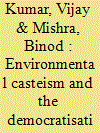

|
|
|
|
|
| Summary/Abstract |
Mainstream Indian environmental movements and academic environmental histories, embedded in casteism, have overlooked the inequitable distribution of natural resources, leaving the ecological crisis facing Dalits unaddressed in both scholarly discourse and public arenas. This study aims to scrutinise the casteisation of natural resources and Dalits’ socio-ecological precariousness in two Dalit self-narratives—Baby Kamble’s The Prisons We Broke and Bama’s Karukku. We seek to deconstruct and transform narratives about environmentalism in India, which can best proceed through the active and progressive intervention of the insecure social classes (mainly Dalits). In doing so, the study will throw light on egalitarian eco-consciousness in Dalit narratives, and highlight Dalit voices as fundamental to shaping post-colonial ecocriticism.
|
|
|
|
|
|
|
|
|
|
|
|
|
|
|
|
| 2 |
ID:
148866
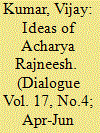

|
|
|
|
|
| Summary/Abstract |
Almost twenty-five years after his death Acharya Rajneesh is remembered
for his thoughtful speeches and lectures as a spiritual teacher. Dr Ram
Chandra Prasad his first biographer considered, him as the greatest
living orator in India (Motilal Banarsidas 1968). At his Samadhi at Pune
his epitaph reads “Osho was never born never died only visited this
planet earth 11.12.1931 to 19.01.1990.”
|
|
|
|
|
|
|
|
|
|
|
|
|
|
|
|
| 3 |
ID:
060319
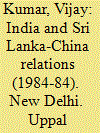

|
|
|
|
|
| Publication |
New Delhi, Uppal Publishing House, 1986.
|
| Description |
vii, 196p.
|
|
|
|
|
|
|
|
|
|
|
|
Copies: C:1/I:0,R:0,Q:0
Circulation
| Accession# | Call# | Current Location | Status | Policy | Location |
| 026367 | 327.54051/KUM 026367 | Main | On Shelf | General | |
|
|
|
|
| 4 |
ID:
190959
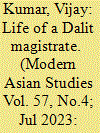

|
|
|
|
|
| Summary/Abstract |
This article discusses Chaudhari Mulkiram (April 1910–August 1954) and the contesting ideologies, memories, histories, and socio-political conditions surrounding his career from the 1920s to the mid-1950s. Mulkiram belonged to the Dhangar, a sub-caste of the Khatik caste in Meerut. He was the first Dalit of the United Provinces (UP) who qualified for the Public Service Commission in 1939. This article shows his socio-religious and socio-political relations and responses to the Arya Samaj, Congress, and Scheduled Caste Federation. It reveals how the representatives of these agencies portrayed his life and work. This article also discusses how his relations and responses helped and influenced his caste members in the western UP. It argues that the Arya Samaj, Harijan Sevak Sangh, and Congress used the first generation of Dalit civil servants like Mulkiram to cultivate local leaders and to mobilize local Dalits, peasants, labourers, and villagers to act in their political interests against Ambedkar’s movement. Hence, in the 1940s and early 1950s, Mulkiram presented himself as a Gandhi bhakt, Jan Neta (public leader), and Sanyasi (household monk and socio-religious reformer).
|
|
|
|
|
|
|
|
|
|
|
|
|
|
|
|
| 5 |
ID:
148864
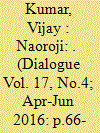

|
|
|
|
|
| Summary/Abstract |
The grand old man of India, Dadabhai Naoroji (1825-1917) stood as one
of the tallest nationalist leaders who aroused the feeling of economic
and political nationalism during the early freedom struggle. The chain
of personalities which carried India through its modern socio-economic
and political crises can be simply outlined as the main line of succession
begins with Dadabhai Naoroji and passes to Ranade, Gokhale and Gandhi
before India’s independence. However, the first figure in this chain,
rightly called by Professor Orlebar of Elphinston College, his teacher,
as “the Promise of India,” Dadabhai Naoroji was neither a Hindu nor a
Muslim but a Parsee, a highly progressive group of Indians. Regardless
of his cultural background, his appeal to all communities in India was
immense.
|
|
|
|
|
|
|
|
|
|
|
|
|
|
|
|
| 6 |
ID:
079361
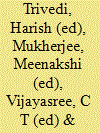

|
|
|
|
|
| Publication |
New Delhi, Oxford University Press, 2007.
|
| Description |
xxxii, 312p.
|
| Standard Number |
0195690249
|
|
|
|
|
|
|
|
|
|
|
|
Copies: C:1/I:0,R:0,Q:0
Circulation
| Accession# | Call# | Current Location | Status | Policy | Location |
| 052621 | 327/TRI 052621 | Main | On Shelf | General | |
|
|
|
|
| 7 |
ID:
185393
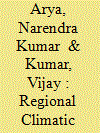

|
|
|
|
|
| Summary/Abstract |
India and China were targeted by Western nations for their opposition to a
promise to “phase out” coal when negotiating the final agreement in Glasgow. Instead, the two decided to “phase down” coal, causing dismay and alarm about the world’s ability to keep global warming to 1.5 degrees Celsius. Prime Minister Narendra Modi committed, among other things, to achieve net-zeroe missions by 2070, to reduce carbon emissions by one billion tonnes by 2030, and to increase the number of renewable resources in the energy mix to 50%.
|
|
|
|
|
|
|
|
|
|
|
|
|
|
|
|
| 8 |
ID:
172838
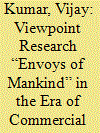

|
|
|
|
|
| Summary/Abstract |
The physical presence of humans as astronauts beginning in 1961 highlights the collective achievement of humanity and opens up new avenues of outer space activities. Astronauts are granted the status of “envoys of mankind in outer space,” thereby making them eligible for certain protections and privileges. Today, in the era of commercial space, the applicability of these protections and privileges is questioned in regard to commercial human spaceflight and space tourism. In this context, the definition of astronauts is explored by assessing the various international legal documents on outer space, especially the Outer Space Treaty, Rescue Agreement, and the Liability Convention. This paper examines whether space tourists should be considered “astronauts” and “envoys of mankind.” The paper argues for a broader interpretation of the existing legal regime of outer space and suggests a new legal document for commercial human spaceflight.
|
|
|
|
|
|
|
|
|
|
|
|
|
|
|
|
|
|
|
|
|